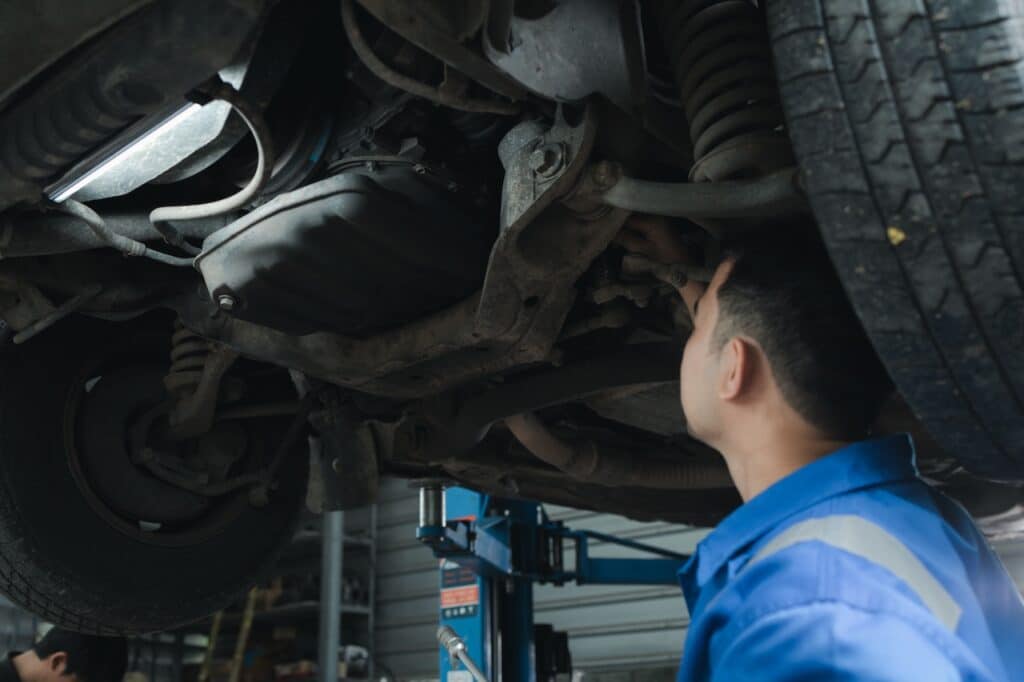Accidents can be stressful, especially when your vehicle’s undercarriage takes a hit. Whether it’s a speed bump taken too fast or an accident that damages vital components, knowing how to quickly assess and respond to undercarriage damage helps keep repair costs down and your car running smoothly.
Undercarriages Are Often Overlooked. Why?
The undercarriage of a car is an often overlooked and neglected area. The exterior of the vehicle is what people see and interact with daily, so it’s no surprise that it receives most of your attention. Many drivers rarely give the undercarriage a second thought until something goes wrong.
However, the undercarriage plays a crucial role in keeping your car functioning properly. It houses vital components such as the exhaust system, transmission, and suspension, which are all susceptible to damage in an accident. Ignoring undercarriage damage can lead to bigger issues down the road, so it’s essential to address any problems as soon as possible.
Identify Undercarriage Damage Using These Common Signs
Did you run over an extra large pothole on the road and need to know whether to take your vehicle to the shop? Here are the biggest signs of undercarriage damage.
Scraping or Dragging Noises
If you hear scraping or dragging noises underneath your car while driving, it’s a clear indication of damage. This noise is typically caused by the damaged undercarriage parts rubbing against the ground or other components. You might even see sparks flying out from under the car or a hanging piece of metal.
Lowered Ride Height
An immediate change in your vehicle’s ride height after an accident could indicate damage to the undercarriage. If the car appears lower to the ground than usual, it’s likely due to a damaged suspension or exhaust system.
Leaking Fluids
Accidents can cause dents and punctures in your car’s undercarriage, leading to leaks of essential fluids like oil, coolant, or transmission fluid. If you see any puddles forming under your vehicle, it could be a sign of damage.
Decreased Acceleration or Performance
Any harm to the undercarriage can affect the performance of your vehicle, especially if it involves the exhaust system. If you notice a decrease in acceleration or overall performance after an accident, it’s crucial to have your undercarriage checked.
Rust or Corrosion
Exposure to road salt, water, and other elements can cause rust and corrosion on the undercarriage of your car. While it may not immediately affect performance, it can weaken the structure over time and severely impact your safety.
What to Do If You Suspect Undercarriage Damage
If you notice any of the signs mentioned above or have been involved in an accident, it’s essential to take action immediately.
- Check for Additional Signs of Damage: First, safely pull over and inspect the undercarriage of your car for any visible damage. If you’re not sure what to look for, it’s best to have a professional mechanic do a thorough inspection. They can assess the extent of the damage and provide a diagnosis.
- Report the Accident: Next, contact your insurance company to report the accident and any potential damage to the undercarriage. If you have comprehensive coverage, it may cover the cost of repairs.
- Take Your Vehicle to the Shop: Finally, depending on the severity of the damage, you may need to have your car towed to a collision repair shop for repairs. It’s important not to continue driving with damage as it can cause further harm and put your safety at risk.
Start Your Undercarriage Inspection at Valley Collision
At Valley Collision Center, we understand how collisions can impact your vehicle, particularly the undercarriage. A well-maintained undercarriage is essential for your car’s performance and longevity. Our experienced technicians specialize in repairing undercarriage damage and can get your car back on the road safely and efficiently. Contact us today for all your auto body repair needs.

